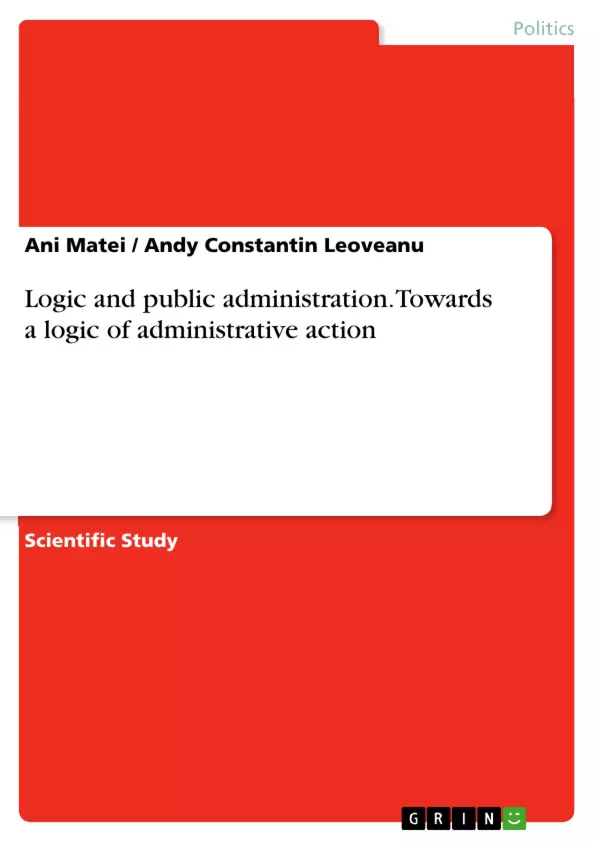Starting from the idea that public administration is a complex phenomenon, in order to be understood, it is necessary to use an interdisciplinary approach.
Due to the complexity of this phenomenon, the science of administration has relations with several branches of science and with many scientific disciplines, among which an important role manifest: administrative law, management (in this sense emerging public management), economics (in the form of public economics), sociology (outlining a sociology of administration), psychology, theory of decision, logic (being able to discuss about a logic of the administration’s action, a logic of the administrative norms) demographics, informatics etc.
Logical analysis, in the concept of Gheorghe Enescu, “represents the analysis of the logical structure of a given process of thought (expressed in a text or discourse), for the purpose of verifying the correctness of the logic. Logical analysis presupposes the following steps” :
1) analysis of language clarity and accuracy (manner in which the terms are defined and the sentences are formed);
2) analysis of the manner in which classifications and/or divisions are performed (if any);
3) analysis of arguments and, in general, of the logical coherence of thought;
4) analysis of consistence of thought (of non-contradiction).
“The main condition of a process of thought is argumentation (reasoning); where there is no reasoning, there is no thought, in the exact sense of the word, but mere expression of opinion or known information. An important place in the logical analysis is played by “logical formalization”.
The work paper is structured on two chapters and conclusions and aims to analyze the level of applicability of the science of logic, in general, and of the logic of norms and actions (as branches thereof) in the sciences of administration, as well as the contributions brought through the science of logic to the analysis of the public decisions and of the administrative phenomenon.
In the first chapter of the paper there were presented aspects of theoretical order connected to the logic of action, modal logic, logic of norms, decision, public decision and the method of the decisional trees.
In the second chapter there are emphasized by example: the advantages of using the method of decisional trees in the analysis of and of using the three indexes referring to the power of an actor to decide through vote.
Table of Contents
- Preface - Arguments for a logic of administrative action
- Introduction
- Research objectives, hypotheses and methodology
- Chapter I - Public administration and logical approach
- I.1. General aspects regarding the types and forms of analysis of public administration
- I.2. Logic of the action and logic of the norms and their applicability to the administrative sciences
- I.3. Decision element of the managerial activity
- I.4. Public decision
- Chapter II - Relevant aspects regarding the application of logic in public administration
- II.1. Fundaments of the decisional logic
- II.1.1. Cooperation logic in decision-making
- II.1.2. The decisional trees, logical – mathematical approach
- II.2. The logical analysis of public decisions – Case study
- II.1. Fundaments of the decisional logic
- Conclusions
- Bibliography
- Annex
Objectives and Key Themes
This work aims to explore the development of a specific logic for administrative action within the broader field of public administration. It argues that such a logic is essential for the rigorous analysis of administrative processes, given the increasing complexity of public administration in the modern world.
- The need for a distinct logic of administrative action within public administration
- The relationship between logic and administrative sciences
- The application of decisional logic and its relevance to public administration
- The role of action logic in understanding administrative action
- The potential for a new logic of administrative action to contribute to the development of public administration as a scientific field.
Chapter Summaries
The Preface introduces the concept of a logic of administrative action and its significance within the context of interdisciplinary research. It highlights the need for a specific logic to guide the study of administrative processes, considering the increasing complexity of public administration. The chapter argues that a distinct logic can provide a more rigorous approach to administrative research.
Chapter I delves into the relationship between public administration and logical approaches. It examines the types and forms of analysis used in public administration and explores the applicability of logic to administrative sciences. This chapter lays the groundwork for understanding the relationship between logic and the decision-making processes in public administration.
Chapter II focuses on the practical application of logic in public administration. It examines the fundaments of decisional logic, including the role of cooperation and the use of decisional trees in decision-making. The chapter further explores the logical analysis of public decisions through a case study. This chapter provides concrete examples of how logical principles can be applied in real-world administrative scenarios.
Keywords
The primary focus of this text is on the development of a logic of administrative action, with a focus on the practical applications of logic in public administration. Key terms and concepts include decisional logic, action logic, public administration, decision-making, and administrative processes. The text emphasizes the importance of a structured approach to understanding and analyzing the complexities of public administration.
- Citation du texte
- Ani Matei (Auteur), Andy Constantin Leoveanu (Auteur), 2014, Logic and public administration. Towards a logic of administrative action, Munich, GRIN Verlag, https://www.grin.com/document/267865



